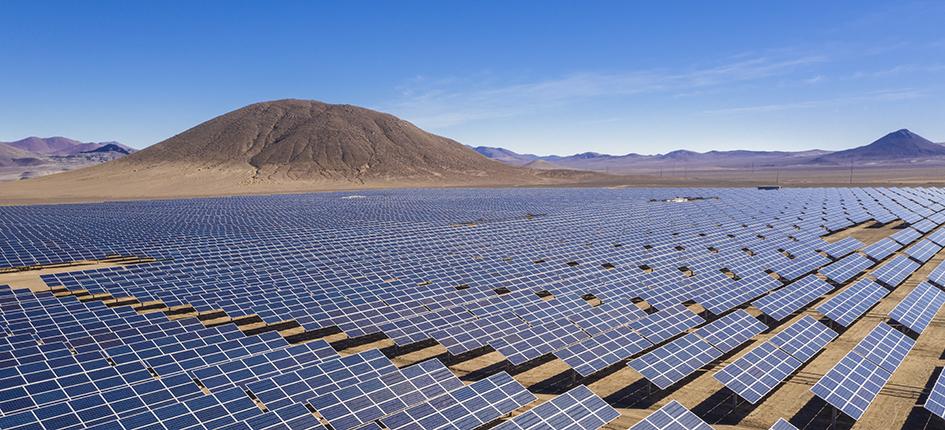Over the past 15 years, in your role as Minister of the Environment, professor, advisor to the World Bank, chairman of foundations, and winner of several international awards, you have followed the fields of climate change and environmental technologies very closely. Which global development has impressed you the most?
Clearly the biggest revolution that has taken place in recent times in what we have seen across Latin America was the deployment of renewable energy, which has grown exponentially. Today, renewables account for a large part of the investments in the energy sector.
Is this also valid for Chile?
Absolutely. In the case of Chile, in the year 2020 we are talking about investments of about 1000 megawatt to reach almost 2600 megawatt renewable energies. This kind of growth has no historical parallel. It can only be compared to the industrial revolution.
The increase in import taxes announced by the European Union suggests that our carbon-intensive exports are vulnerable to this tax. We should therefore aim to reduce CO2 emissions in our manufacture.
Chile's export statistics are dominated by mining and agricultural products. Both are important sectors worth billions of dollars, where clean technology can be applied particularly effectively. How can this great potential best be harnessed?
The country has a historical dependence on the extraction of natural resources to generate wealth. It generates around 2.4 kilos of extracted material for every dollar, which is almost three times the OECD average. Chile therefore has to learn to be more efficient in its use of resources and hence investing in climate resilient agriculture would seem to be a measure that also makes the country's economy more sustainable. Similarly, mining also requires a clean technology transformation.
The increase in import taxes announced by the European Union suggests that our carbon-intensive exports are vulnerable to this tax. We should therefore aim to reduce CO2 emissions in our manufacture. At the same time this transformation can lay the foundation for a new green hydrogen industry, which the industry needs in order to clean itself and therefore Chile benefits from the climate commitments all over the world by requiring more copper and more lithium. This could allow Chile to renovate its economic structure from an extractive one to a renewable productive matrix.
As a leading global supplier of resources such as copper, lithium and cobalt, Chile plays a strategic role in growing electro-mobility. How is the country positioning itself to be a responsible partner in value chains?
Chile must not lose its leadership in supplying the various materials that are required for the zero emissions transition. The World Bank estimates that copper would be required at double the current rate in order to meet the demand for this mineral in the wiring of solar panels, wind turbines, storage systems and electric batteries. The same is true for lithium, where we have lost our share of the international market and we must regain this leadership, but also with sustainability. We also have the capacity to supply cobalt, for example, where we clearly understand the difficulties of extraction in deposits that are concentrated in conflict zones, such as it is the case of the Republic of Congo, where the extraction of cobalt is associated with problems of child labour. In doing so, Chile has the possibility of being a responsible partner, which assures that the copper, lithium or cobalt that is extracted does not contribute to the deterioration of the water supply, does not deteriorate atmospheric pollution or cause climate change, and certainly includes the communities in development. This is the vision we need to have in order not to replicate the structure of iniquities that the current economy has and to allow us to redress them in the construction of the green economy.
You are part of an exclusive panel advising the Chilean government on its Green Hydrogen strategy. What role will Chile play in the global energy transition in the future and what needs to be done to achieve it?
The possibilities for green hydrogen are gigantic. What happens is that Chile has about 70 times more renewable potential than it consumes today. Therefore, to take advantage of this we have to transform renewable energy into solar and wind fuels that the world needs to be able to run heavy machinery in applications that do not necessarily allow the use of electricity. Therefore, replacing copper, which has an expiry date in the long term, with an infinite renewable fuel such as hydrogen gives hope that Chile can transform its productive matrix.
That is why it is essential that we aim to have technological partners with whom we can develop solutions in applications like heavy machinery, where some of the greatest challenges of incorporating green hydrogen lie.
What role can international suppliers of innovative and clean technologies play?
International suppliers are very important to be able to implement this solution. For example by developing and providing technologies that do not necessarily exist by today: The transformations in mining to stop the incorporation of fuel, the innovations required to be able to run ships, to run trains and buses, all this is still to be built. Therefore, although we have the possibility of being able to have the cheapest green hydrogen in the world because we have the most important input - renewable energy - this does not mean that we are on the right track. That is why it is essential that we aim to have technological partners with whom we can develop solutions in applications like heavy machinery, where some of the greatest challenges of incorporating green hydrogen lie.
About Marcelo Mena
Marcelo Mena is a scientist and professor turned activist and policymaker. He is the director of the Climate Action Center at Pontificia Universidad Católica de Valparaíso (PUCV) and a member of the WEF Global Futures Council on Clean Air. Previously he was the practice manager in climate research at the World Bank and the former vice Minister and Minister of the environment for Chile under President Bachelet from 2014 to 2018. He spearheaded multiple environmental initiatives such as taxes on new car sales and power generation based on local and global air pollution - the first of their kinds globally. He helped craft a landmark agreement to phase out coal power generation, create 45 thousand square kilometers of national parks, protect 1.3 million square kilometers of ocean and institute the first national plastic bag ban in the Americas.
At the World Bank, Mena helped create the Coalition of Finance Ministers for Climate Action, which includes 53 ministers that manage 2.9 trillion dollars a year in national budgets, or 10 percent of global GDP, contributed to the Action Plan on Climate Change Adaption and Resilience and helped design of the new phase of NDC Support Facility.
Marcelo Mena earned his PhD in environmental engineering, focusing his research on estimating the externalities of biofuels, power generation, transportation and residential heating. He used his research to advocate for renewable energy and push for more stringent regulations to stop dirty coal power generation in Chile. In his career, he has received awards from UNEP, National Geographic, Oceans Unite, NASA and EPA as well as fellowships from MIT and the Fulbright Commission.





